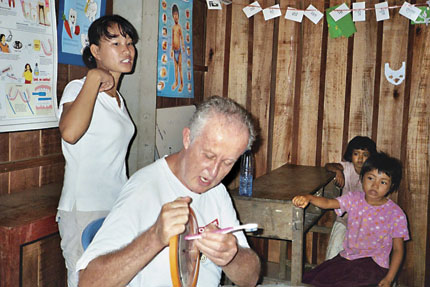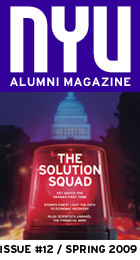alumni profile
Brightening Neglected Smiles
Robert Renner / WSC ’64
by Ted Boscia
When traveling abroad, it’s always helpful to know a few stock phrases in the local language, such as “Two more beers, please” or “Is the hotel far?” Dentist Robert Renner has acquired a more unusual vocabulary. He can now say, “Open your mouth wide” in a handful of languages, including the Mayan dialect Ixil.
Since his retirement in 2002, when he launched a mobile clinic in El Salvador with the nonprofit Save the Children, Renner has regularly visited the forgotten corners of the world to deliver dental care to children. Many of his patients have never seen a dentist, let alone owned a toothbrush. Most are malnourished and plagued by decaying teeth, the result of a sugar- and carbohydrate-fueled diet. He operates by setting up in the ramshackle homes and schools of his hosts, few of which enjoy running water, electricity, or refrigeration. There “Dr. Bob,” as the children call him, extracts cavities and abscesses by flashlight, his small patients propped up on chaise lounges or desks. “You have to work under crazy conditions and not get frustrated,” says Renner, 66. “But once you get started, you get hooked.”
Part of the draw is the staggering reach one can have. On a typical day at a clinic, Renner treats up to 200 children—compared to the average of 10 patients he’d see when he practiced on Long Island. He now treats close to 5,000 children annually and spends nine months abroad each year conducting mobile clinics in El Salvador, Guatemala, and Cambodia. Vast disparities in treatment divide the wealthy and the poor in these places. Cambodia, for instance, has just 300 dentists for a population of 14 million. This reality has led Renner to expand his focus to mentoring native doctors and educating parents about the importance of dental care and healthy diets. “In many cases, these countries are starting from scratch,” he says.
Renner’s dedication to caring for indigent kids is borne out of his own experience as an orphan. A native New Yorker, Renner went to Bayside High School in Queens and, though cared for by his godparents, felt no acute sense of family. At age 17, he started working at Broadway Savings Bank in Manhattan and saved enough money to pay his way through NYU, where he studied languages, before attending dental school at Columbia University. Over the next three decades, Renner worked as a dental educator at Stony Brook University, at the North Fork VA Hospital, and in private practice on Long Island. At every stage, he nurtured his passion for volunteering—running clinics at a Utah Navajo reservation and caring for migrant workers near his home. “I know the value of charity and having people reach out to you when you’re all alone,” he says.
With the help of his wife, Purobi Phillips, a physicist, Renner oversees every aspect of his grassroots endeavor: coordinating country visits with Save the Children and other nongovernmental organizations, obtaining supplies and equipment, and attracting professional and dental student volunteers. The couple spends about $40,000 annually to run the seasonal clinics.
Last month, Renner started a fourth clinic in the Philippines, where he will face a perennial problem: allaying children’s fears of the dentist—and locals’ distrust of a foreigner. Seven years ago, for example, when he first treated Wendy, a 12-year-old in El Salvador, for severe cavities, she was incredibly frightened. But she now has perfect teeth and comes running to “Dr. Bob” whenever he visits. His time-tested strategy for winning over patients is to pack dental supplies, surgical instruments, and several suitcases of crayons, coloring books, and toys. If a child has no cavities or gum disease, she gets her pick, plus a high five. “It’s like a fiesta when we go to Wendy’s village,” Renner says. “All the parents and kids wear their finest clothes and turn out to see the dentist.”
photo © Dr. Purobi Phillips







